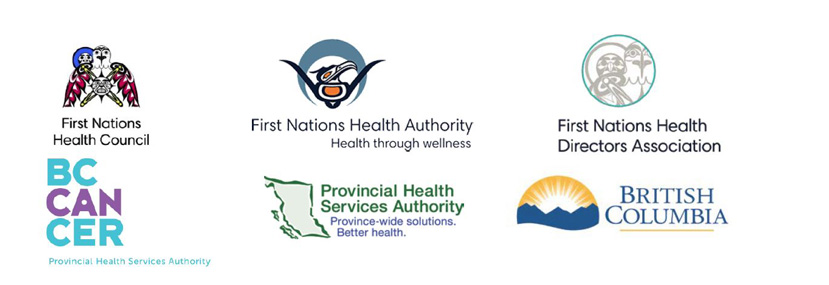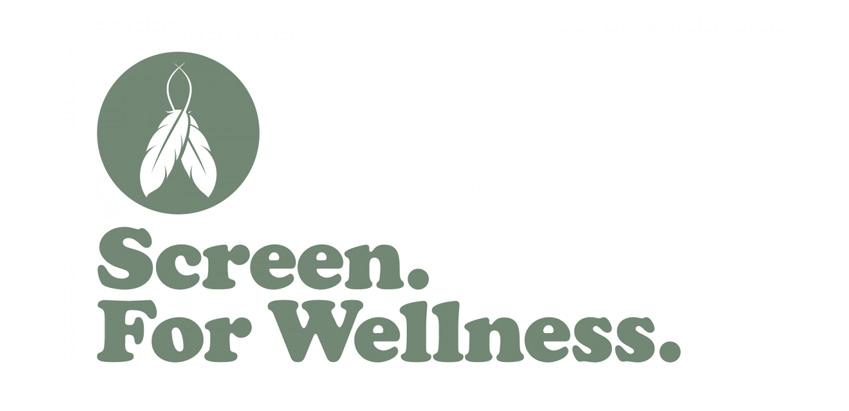For Immediate Release

COAST SALISH TERRITORY – VANCOUVER, BC – The First Nations Health Council (FNHC), First Nations Health Authority (FNHA), First Nation Health Directors Association (FNHDA) and BC Cancer today launched a campaign to promote increased cancer screening and awareness among the province's Indigenous populations.

The "Screen. For Wellness." campaign will specifically target increased awareness of BC's colon, cervical and breast cancer screening programs, and seek to increase the number of Indigenous people participating in cancer screening programs. Screening is an important part of cancer prevention strategies, because early detection can help improve treatment options and survival.
A study published last year by the FNHA and BC Cancer found that First Nations people in BC had higher rates of colorectal and cervical cancer than non-First Nations people and were less likely to survive a cancer diagnosis, even with cancers that were less prevalent among First Nations. The lower survival rates were attributed to challenges in accessing high-quality, timely, culturally safe, appropriate and effective cancer screening and treatment, especially in rural and remote areas. Many First Nations people's cancer journeys are negatively impacted through the experience of racism in health care settings.
"Screen. For Wellness." will use social media, a website www.screenforwellness.com and other tools to not only build awareness and encourage individuals to get screened for colon, breast and cervical cancer, but also to make them champions for cancer screening among their friends, families and communities.
The campaign is part of a multi-agency strategy to improve cancer care and supports for Indigenous peoples across British Columbia announced in December 2017. The Indigenous Cancer Strategy addresses all aspects of cancer, from prevention to survivorship and end-of-life. Increasing access to and participation in colon, cervical and breast cancer screening is one of its six priority areas.
The "Screen. For Wellness." campaign was launched at Gathering Wisdom for a Shared Journey IX, a forum held May 15-17, 2018 that was hosted by the FNHC and supported by the FNHA and FNHDA. Gathering Wisdom brings together First Nations political and health leadership from across BC to engage in direct dialogue with each other and federal, provincial and health system partners on factors that influence the health and wellness of their children, families and communities.
Quotes
Adrian Dix, BC Minister of Health
"It is critically important that everyone in British Columbia feels encouraged to access the province's three population-based cancer screening programs. The data speaks for itself, it's my hope that our provincial cancer agency, working together with First Nations to develop a prevention campaign that is based on cultural safety and relationships, will close this unacceptable gap."
Grand Chief Doug Kelly, Chair, First Nations Health Council
"This campaign is founded on the teachings that we are connected in many ways, but the health and wellness of our communities holds us together. A cancer diagnosis for one of us, affects all of us. That's why checking the body for certain cancers—before there are symptoms—can help you, your family, and your Nation be well. Getting screened for cancer could save your life, or the life of someone you know. The FNHC looks forward to seeing this campaign come alive in our communities."
Dr. John Spinelli, Vice President of Population Oncology for BC Cancer.
"BC Cancer is committed to ongoing collaboration to improve the cancer experience for all Indigenous people in British Columbia. This includes providing safe and equitable cancer screening services, which can save lives by finding cancer early."
Kim Brooks, President, Frist Nations Health Directors Association
"The First Nations Health Directors Association looks forward to promoting this campaign and partnering with First Nations at the local level to encourage screening. As Health Directors and Health Leads, we know all too well the reality that in the community, what affects one of us, affects all of us. Our members can play a crucial role in providing on-the-ground support, and in encouraging regular checkups and screenings for all members of our communities."
Dr. Shannon McDonald, Acting Chief Medical Officer, First Nations Health Authority
"This screening campaign is part of the implementation of the Indigenous Cancer Strategy that was released in December 2017. Our ultimate goal with this campaign is to increase participation in cancer screening programs so that First Nations people detect cancer earlier to improve treatment options and chances for survival. We'd like to see people having ongoing conversations with their friends, families and communities about making cancer screening part of their wellness journeys."
Contact:
Gavin Wilson
First Nations Health Authority
778-991-1229
Gavin.wilson@fnha.ca
Kevin Sauve
BC Cancer
604-842-1177
kevin.sauve@bccancer.bc.ca
Backgrounder
Cancer is the leading cause of death in Canada, ahead of heart disease and stroke, accounting for almost 30% of all deaths. Nearly one in every two Canadians is predicted to be diagnosed with cancer in their lifetimes, largely due to Canada's aging population. However, not every type of cancer is the same. Many forms of cancer are very treatable and have high rates of survival, if detected early. Many other forms can be prevented almost entirely, if the right proactive steps are taken.
In December 2017, the FNHA, in collaboration with BC Cancer, Métis Nation British Columbia and BC Association of Aboriginal Friendship Centres, released a strategy called Improving Indigenous Cancer Journeys in BC: A Road Map. Only the second of its kind in the country, the strategy addresses all aspects of cancer, from prevention through to survivorship, with a focus on delivering culturally safe cancer care. Its priorities are in line with the calls to action for health by the Truth and Reconciliation Commission of Canada. Insight was gained from engagement over a number of years with Indigenous cancer patients, survivors and their families.
The strategy's six priorities are:
• developing partnerships between the health system and Indigenous communities;
• working with Indigenous communities to help prevent cancer before it starts;
• increasing access and participation in colon, cervical and breast cancer screening;
• promoting cultural safety and humility in cancer care services;
• supporting Indigenous cancer survivorship and end-of-life experiences; and
• improving knowledge of Indigenous cancer experiences.
The strategy was in part informed by the October 2017 study conducted by the FNHA and BC Cancer on cancer incidence and survival among First Nations people in BC. The study found that First Nations in BC had a lower overall incidence of cancer compared to the non-First Nations population in BC, although significantly higher rates of colorectal and cervical cancer. First Nations were also found to have significantly lower survival rates for many cancers. Access to and utilization of cancer screening programs was one of the factors believed to cause this difference in survival rates.
The "Screen. For Wellness." campaign encourages increased access to BC's three population-based screening programs:
• Breast cancer is one of the most commonly diagnosed cancers among First Nations women in BC. Mammograms can help find breast cancer early, when it is small and there are more options for treatment. Regular mammograms are available to women 40 years and over, even if they have no symptoms.
• Screening regularly with a Pap test can reduce risk of cervical cancer by 70%. Early detection means more treatment options and better outcomes. People aged 25 to 69 who have a cervix should make regular Pap tests a part of their wellness journey, even if they have no symptoms.
• Colon cancer is one of the most commonly diagnosed and deadly forms of cancer, but with early detection, survival rates are as high as 90%. Screening also detects cancer early, which means more treatment options and better outcomes. Women and men between the ages of 50 and 74 should make colon cancer screening a regular part of their wellness journey, even if they have no symptoms.
BC Cancer, part of the Provincial Health Services
Authority, is committed to reducing the incidence of cancer, reducing the
mortality from cancer and improving the quality of life of those living with
cancer. It provides a comprehensive cancer control program for the people of
British Columbia by working with community partners to deliver a range of
oncology services, including prevention, early detection, diagnosis and
treatment, research, education, supportive care, rehabilitation and palliative
care. For more information, visit www.bccancer.bc.ca or follow us on Twitter @BCCancer.
Download this media release in PDF format here (142 KB)

